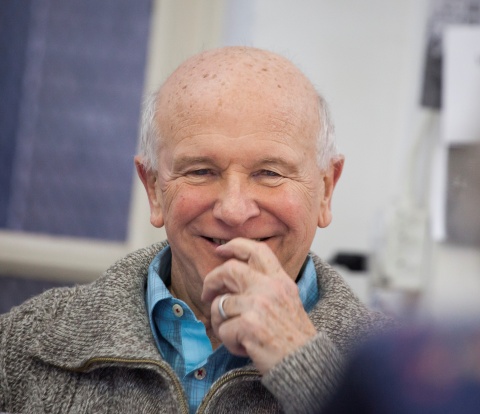Columbia College | Columbia University in the City of New York
Take Five with Terrence McNally ’60

MICHAEL NAGLE
What were you like when you arrived at Columbia?
I was a happy, somewhat self-confident 17-year-old who was eager to experience New York City. I had wanted to be there ever since On The Town, a terrible movie musical, actually, but its opening number with those three sailors leaping about singing “New York, New York” (the original Leonard Bernstein, Adolph Green, Betty Comden version) made me want to live in a city where people sang and danced in vivid Technicolor. I would pick up some sort of education along the way. I would not let my beloved high school English teacher, Mrs. Maurine McElroy, down. She was very proud I had won a scholarship to Columbia. My parents thought it was a hotbed of Communism. I wanted to see My Fair Lady and be at Maria Callas’ debut at the Metropolitan Opera.
What do you remember about your first-year living situation?
I grew up sharing a bedroom with my brother, Peter, six years younger, so the notion of privacy was foreign to me. Our first night together, my roommate did not want to join me in seeing a Broadway show. Clearly we were destined not to become intimates. He pretty much stayed on his side of our small room in Hartley and I stayed on mine, except when I climbed up onto the top bunk. He had gotten there first and claimed the lower for himself. I’m sure I never forgave him for it. I thought the room was Spartan to a sadistic extent and it remained my only complaint my entire freshman year. Visits to friends at Yale only confirmed my disappointment with Columbia housing. My sophomore year in a Hartley single was a little better but true happiness began my junior and senior years with my apartment on Barrow Street in the West Village. It was a sixth floor walk-up and it cost $45. I just hoped Columbia didn’t find out I was living off-campus. For some reason, scholarship students weren’t supposed to. I was an unpopular waiter in the Butler Hall dining room and an under-parted, part-time librarian at La Maison Française, a facility that no one seemed to know existed except the woman who ran it. Mrs. Breunig reminded me of Melina Mercouri, so I developed a crush on her, even though I was gay. (This was 1956, remember, and I was 17.)
What class do you most remember and why?
Andrew Chiappe ’33, GSAS’39’s Shakespeare class and his seminar on King Lear. They were each life-changing in their way. In the first we read the plays chronologically, which was a radical concept in its day. All my Ivy League friends were reading the plays by category: comedies, histories, tragedies. We studied Shakespeare as he developed as a thinker and writer. We found the connections between Lear and The Tempest; we knew he had to write a spotty play in order to write a great one. We studied his growth and development as an artist instead of focusing on his greatest hits. I still have my Pelican Shakespeares with my notes written in the margins. To this day, I study the works of any artist I admire and want to know more about chronologically instead of only staying with their masterpieces. As for the King Lear seminar, we weren’t even halfway through the play when the spring semester ended. We parsed every word; we argued about every interpretation. I’m still at it. King Lear remains, for me, the greatest achievement of the human mind. I would not trade it for all of Mozart, Michelangelo or Chekhov. I thank Professor Chiappe and my fellow seminarians (I believe there were eight of us) for teaching me that a great work of art is worth a lifetime of study and the ultimate acknowledgement that it is finally unknowable. It is there for us all our lives to ponder and engage with. The Class of 2060 will be doing the same — and probably with no better results.
Did you have a favorite spot on campus and what did you like about it?
I liked the scale of the Livingston dining room and I didn’t mind the food as much as most of my classmates did. The Chock full o’ Nuts on the west side of Broadway at 116th Street was my salvation many a late evening with its heavenly coffee, hot dogs on a split bun (for holding the mustard and relish) and dreamy cream cheese on raisin bread sandwiches. The West End was a good place to get drunk. Did they even serve food there then? I also liked the massive, genuine porcelain urinals in Low Library. I always expected to see Teddy Roosevelt or J.P. Morgan pop in for a pee. The freshman crew practiced rowing in tanks in the basement of Low and I thought that was a very cool place on campus that very few people knew about.
What, if anything, about your College experience would you do over?
When, during freshman orientation, I was told by my faculty adviser — the same professor whose two classes on Shakespeare remain highpoints of my entire life — that it was mandatory that I choose a science, I would not blithely answer “astrology” again. “I think you mean astronomy, Mr. McNally,” he said. From that moment, I think he viewed me with some suspicion during the next four years. That “astrology” has colored my life ever since. So has Professor Chiappe. My friends who graduated from Harvard and Yale think they made better connections at their respective alma maters but that I got the better education. I’m not arguing.

